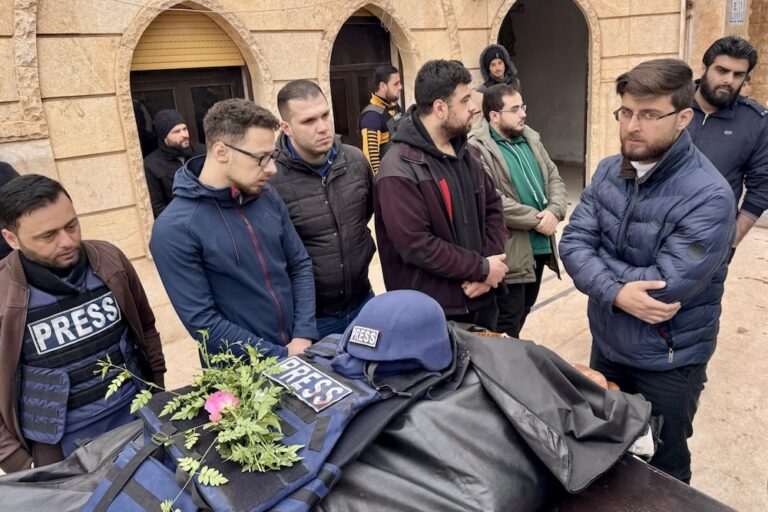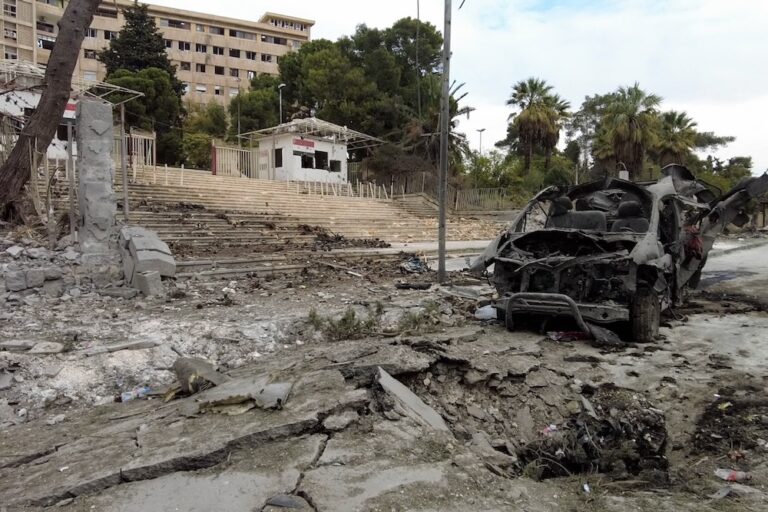(RSF/IFEX) – On 24 May 2002, RSF protested to Syria over the exclusion of journalists from recent trials of regime opponents. The organisation noted that the move demonstrated the extent to which the authorities have “no wish to answer to international public opinion” for their rule. “This attitude is clearly a sign of the hardening […]
(RSF/IFEX) – On 24 May 2002, RSF protested to Syria over the exclusion of journalists from recent trials of regime opponents. The organisation noted that the move demonstrated the extent to which the authorities have “no wish to answer to international public opinion” for their rule.
“This attitude is clearly a sign of the hardening of the regime. The jailing of these opponents shows complete contempt for freedom of expression,” said RSF Secretary-General Robert Ménard in a letter to Interior Minister Ali Hamud. “We urge you to reverse this decision and allow the media and international observers to attend the next hearings of these cases,” added Ménard.
On 19 May, all journalists were barred from the second hearing of the State Security Court trial of regime opponent Riad Al-Turk, except for a reporter from the government-controlled news agency, SANA. Journalists had been allowed to attend the first hearing on 28 April.
Al-Turk, a 71-year-old former lawyer, was arrested on 1 September 2001 after calling for a “transition from dictatorship to democracy” during a 6 August meeting at a private home in Damascus. In mid-August, he appeared on the Qatari television station Al-Jazeera and criticised President Bashar al-Assad. He had previously spent 17 years in prison without trial before being released in 1998.
When the trial of Habib Issa and Walid Buni opened before the State Security Court on 14 May 2002, journalists and diplomats were not allowed inside the court, except, once again, for a SANA reporter. The defence lawyers refused to allow the judge to start cross-examining and demanded that the trial be opened to the public. The next hearing for Buni, a doctor and member of a civil society organisation, has been set for 12 June. Issa’s next hearing is set for 19 June. He is a lawyer, former journalist and spokesman for the Jamil el-Atassi meeting club. “The things they are accused of saying are simply free expression – just words, statements, press articles and remarks in political company,” lawyer Abdel Azim told the Agence France-Presse agency.
On 9 May, journalists were also barred from the State Security Court trial of economist Aref Dalila and businessman Habib Saleh, as were diplomats and the families of the accused. The next hearing is set for 3 June.
Al-Turk, Issa, Buni, Dalila and Saleh are among a group of opposition activists who were arrested in the summer of 2001 and charged with “trying to change the constitution by illegal means, incitement to religious dissent and sedition, spreading false information and trying to harm the image of the state”. On 4 April, the Damascus Criminal Court sentenced two members of parliament in the group, Riad al-Seif and Mamoun Homsi, to five-year jail sentences for having allegedly tried to change the constitution “by unlawful means”.
In August and September, several foreign journalists based in Damascus were repeatedly intimidated by the authorities just as these major civil society figures were being arrested. Some were warned not to write about the arrests.


